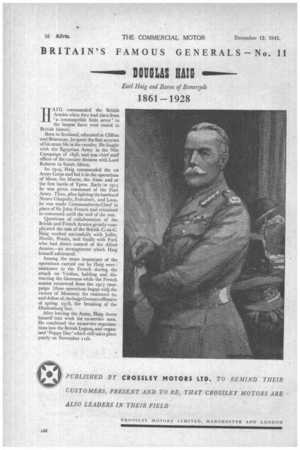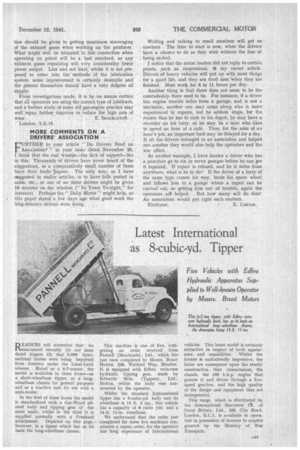DOUGLAS HAIG
Page 34

Page 35

If you've noticed an error in this article please click here to report it so we can fix it.
Earl 'Mr' g and Baron of Bemersyde
1861-1928
1
I AAIG.escowmhmaen commanded hadthe. Bnritish from
'a contemptible little army' to the largest force ever raised in British history. ,
Born in Scotland, educated at Clifton and Brasenose, he spent the first 20 years of his army life in the cavalry. He fought with the Egyptian Army in the Nile Campaign of 1898, and was chief staff officer of the cavalry division with Lord Roberts in South Africa.
In1914, Haig commanded the 1st Army Corps and led it in the operations of Mons, the Marne, the Aisne and at the first battle of Ypres. Early in 1915 he was given command of the First Army. Then, after fighting the battles of Neuve Chapelle, Festubert, and Loos, he was made Commander-in-Chief in place of Sir John French and remained in command until the end of the war.
Questions of collaboration of the British and French Armies greatly complicated the task of the British C.-in-C. Haig worked successfully with Joffre, Nivelle, Petain, and finally with Foch who had direct control of the Allied Armies—an arrangement which Haig himself advocated.
Among the more important of the operations carried out by Haig were :assistance to the French during the attack on Verdun, holding and distracting the Germans while the French armies recovered from the 1917 campaign (these operations began with the victory of Messines) the resistance to, and defeat of, the huge German offensive of spring 1918, the breaking of the Hindenburg line.
After leaving the Army, Haig threw himself into work for ex-service men. He combined the ex-service organizations into the British Legion, and organized 'Poppy Day' which still takes place yearly on November i 1th. tion should be given to getting maximum scavenging of the exhaust gases when working on the producer. What might well be tolerated in this connection when operating on petrol will be a bad standard, as any uriburnt gases remaining will very considerably lower power output. Last and not least, whilst it is not proposed to enter into the methods of the lubrication system, some improvement is certainly desirable and the pistons themselves should have a very defipite oil supply.
From investigations made, it is by no means certain that all operators are using the correct type of lubricant, and a further study of some old gas-engine practice may well repay further inquiries to reduce the high rate of
wear. E. SRACKLETOt London, S.E.15.
MORE COMMENTS ON A DRIVERS' ASSOCIATION rURTHER to your article " Do Drivers Need an ['Association? " in your issue dated November 28, I think that the real trouble—the lack of support—lies in this : ThouSands of drivers have never heard of the suggestions, as a comparatively small number of them buys their trade tapers. The only way, as I have saggested in earlier artieles, is to have bills posted in cafes, etc., or one of we older drivers might be given 10 minutes on the wireless (" In Town To-night," for instance). Perhaps the " Daily Mirror" might help, as this paper stated a few days ago what good work the long-distance drivers were doing. Writing and talking to small numbers will get 03 nowhere. The time to start is now, when the drivers have a chance to do as they wish without the fear of being sacked.
I notice that the union leaders did not reply to certain points, such as suspensions, itt my recent article. Drivers of heavy vehicles will put up with most things for a quiet life, and they are tired men 'when they are finished_ Most work for 8 to 11 hours per day.
Another thing is that there does not seem to be the comradeship there used to be. For instance, if a driver has engine trouble miles from a garage, and is not a mechanic, another one may come along who is more experienced in repairs, but he seldom. Stops, for the reason that he has to rush to his depot; he may have a recorder on his lorry, or he may be a man who likes to spend an hour at a café. Thus, for the sake of an hour's job, an important load may be delayed for a day. If all the driver's belonged to an association and helped one another they would also help the operators and the war effort.
As another example, I have known a driver who has a puncture go to six or seven garages before he can get it repaired. If repair is refused, and he is miles from anywhere, what is he to do? If the driver of a lorry of the same type comes his way,_ lends his spare wheel and follows him to a garage where a repair can be carried out, so getting him out of trouble, again the operators art helped. But how many will do this? An association would put right such matters.
Elmhurst. E. CARTER.




















































